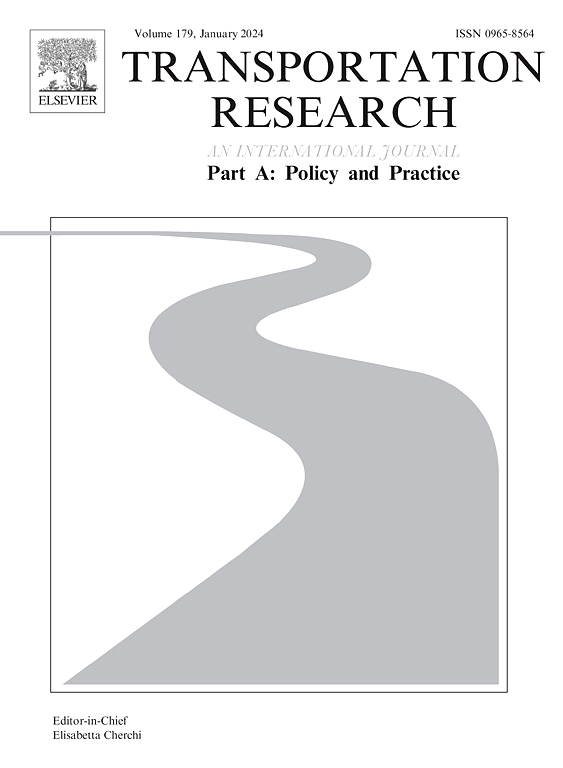2020年东京奥运会期间大都市高速公路交通系统管理实证研究
IF 6.8
1区 工程技术
Q1 ECONOMICS
Transportation Research Part A-Policy and Practice
Pub Date : 2025-07-14
DOI:10.1016/j.tra.2025.104606
引用次数: 0
摘要
本文对东京2020年奥运会期间高速公路交通系统管理(TSM)进行了实证分析。在本研究中,我们研究了TSM策略(包括匝道关闭和路口控制)如何将高速公路网络中的事件相关交通与一般交通整合在一起。利用综合交通数据,根据“假想”累积到达曲线的斜率估计交通需求,并根据观察到的速度和体积计算总延误。然后,通过比较实际实现场景的结果与构建的没有TSM的反事实场景的结果来评估TSM的效果。结果表明,TSM在工作日减少了3.23%的流量需求,在周六、周日和节假日(SSHs)减少了0.77%的流量需求,而在工作日减少了26.90%的总延迟,在SSHs平均减少了8.69%。我们还发现,TSM减少的总延迟每天都有很大变化,这与TSM实现的总持续时间的很大变化有关。基于故障概率,系统评估TSM的合理性,并提出改进计划。这表明,通过在高峰时段集中实施常规TSM,提前启动时间,可以避免固定瓶颈处的拥塞,从而缩短TSM实施的总持续时间。估计结果进一步表明,所提出的TSM可以在减少出行时间的同时容纳更多的交通量,从而提高交通系统的效率。本文章由计算机程序翻译,如有差异,请以英文原文为准。
Empirical study on traffic system management applied to the metropolitan expressway during the Tokyo 2020 Olympic games
This paper presents an empirical analysis of Traffic System Management (TSM) applied to a Metropolitan Expressway (MEX) during the Tokyo 2020 Olympics. In this study, we examined how TSM strategies, including onramp closure and junction control, integrate event-related traffic with general traffic in an expressway network. By utilizing comprehensive traffic data, traffic demands were estimated from the slope of the “imaginary” cumulative arrival curve, and total delays were calculated based on observed speed and volume. The effects of TSM were then evaluated by comparing the results from the actual implementation scenario with those in a constructed counterfactual scenario without TSM. The findings revealed that TSM reduced traffic demands by 3.23 % on weekdays and 0.77 % on Saturdays, Sundays, and Holidays (SSHs), whereas it reduced total delays by 26.90 % on weekdays and 8.69 % on SSHs on average. We also found that the reduction in total delays by TSM largely varied day by day, associated with a large variation in the total durations for which TSM was implemented. Moreover, this study systematically evaluated TSM rationalities based on breakdown probabilities and proposed a schedule for improvement. This suggests that by intensively implementing regular TSMs during peak hours with an advanced starting time, congestion at stationary bottlenecks can be avoided, thus shortening the total duration of TSM implementations. The estimation results further suggest that the proposed TSM can reduce travel time while accommodating more traffic volume, thereby enhancing the efficiency of transport systems.
求助全文
通过发布文献求助,成功后即可免费获取论文全文。
去求助
来源期刊
CiteScore
13.20
自引率
7.80%
发文量
257
审稿时长
9.8 months
期刊介绍:
Transportation Research: Part A contains papers of general interest in all passenger and freight transportation modes: policy analysis, formulation and evaluation; planning; interaction with the political, socioeconomic and physical environment; design, management and evaluation of transportation systems. Topics are approached from any discipline or perspective: economics, engineering, sociology, psychology, etc. Case studies, survey and expository papers are included, as are articles which contribute to unification of the field, or to an understanding of the comparative aspects of different systems. Papers which assess the scope for technological innovation within a social or political framework are also published. The journal is international, and places equal emphasis on the problems of industrialized and non-industrialized regions.
Part A''s aims and scope are complementary to Transportation Research Part B: Methodological, Part C: Emerging Technologies and Part D: Transport and Environment. Part E: Logistics and Transportation Review. Part F: Traffic Psychology and Behaviour. The complete set forms the most cohesive and comprehensive reference of current research in transportation science.

 求助内容:
求助内容: 应助结果提醒方式:
应助结果提醒方式:


